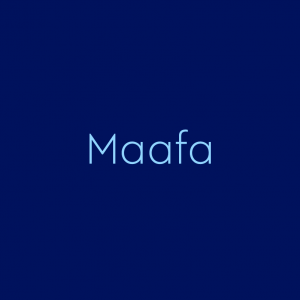Historical & Current Events dictionary
Maafa
or MAAFA [ mah-awf-uh ]
What does Maafa mean?
Maafa, the Swahili word for “great disaster” or “great tragedy,” is a term used to refer to the centuries-long enslavement and murder of millions of Africans by white Europeans, North Americans, and others—and the lasting impacts on African Peoples and the descendants of those who were enslaved.
As a historical event, this is often referred to as the trans-Atlantic slave trade or the Middle Passage, but many scholars consider these terms inappropriate and inadequate in their encapsulation of the atrocities it entails.
The word Maafa is meant to serve as a concise term for a mass-scale event much like how the word Holocaust is used to refer to the systematic mass slaughter of Jews by the Nazis. Relatedly, another term that’s sometimes used to mean the same thing as Maafa is African Holocaust.
Such terms are used by some scholars to emphasize their assessment that genocide (and cultural genocide) were not simply unintentional results of the system of chattel slavery, but rather part of its design.
Currently, there is no consensus around a single term. Some prefer the term Maafa because of its origin in an African language while objecting to the term African Holocaust due to the established use of Holocaust in relation to Nazi atrocities. Others criticize the use of Maafa (which can also be translated as “accident”) because they say it does not sufficiently capture the brutally systematic nature of hundreds of years of enslavement.
The increasing replacement of the word slave (with terms like enslaved person) is likely to result in increased avoidance and replacement of the term slave trade. (Still, some argue that the term trade is useful for its emphasis on the role of economic institutions and motivations in the perpetration of slavery.)
Read about why we updated our dictionary to refer to enslaved persons instead of slaves, as well as other important changes and additions.
Where does Maafa come from?

Maafa is a Swahili word that translates to “great disaster,” “great tragedy,” “unspeakable horror,” or other, similar terms.
The use of the word Maafa as a way to refer to the period of African enslavement—and its lasting toll—is credited to anthropologist Marimba Ani, who first used it in an 1989 article later published as a book titled Let the Circle Be Unbroken: The Implications of African Spirituality in the Diaspora.
The term began to gain more widespread use in the 1990s, when Ani continued to publish works focusing on the ongoing impacts of the Maafa, including what she describes as cultural genocide and a loss of African cultural identity.
Examples of Maafa
Who uses Maafa?
Maafa is perhaps most prominently used by scholars whose work focuses on an Afrocentric view of this historical period. The term has begun to gain more mainstream usage as a concise way to refer to the event (like Holocaust does in referring to the Nazis’ atrocities). Increasing use of Maafa may be due in part due to avoidance of the term slave trade, which is considered by some as an inadequate way of referring to it.
Our ancestors learned many irreversible lessons from the MAAFA. Consequently, Pan Africanism will always be an inevitable necessity. And anyone that goes against this will continue to be humbled by the reality that the journey is hard and we can’t survive alone.
— Jessica (J.A.M.) Aiwuyor 💫 (@JAMAiwuyor) November 13, 2021
I think The mineral wealth of Africa serves as a distraction for what was truly lost in the Maafa. Yes it belongs to Africa but the real wealth of a country is its people
— Nico🇯🇲 (@Nico4now) July 28, 2021
Make an effort to study our cultures before the Maafa
— amammerɛ ɔkofoɔ (@AfroN8V) July 7, 2020
Note
This is not meant to be a formal definition of Maafa like most terms we define on Dictionary.com, but is rather an informal word summary that hopefully touches upon the key aspects of the meaning and usage of Maafa that will help our users expand their word mastery.